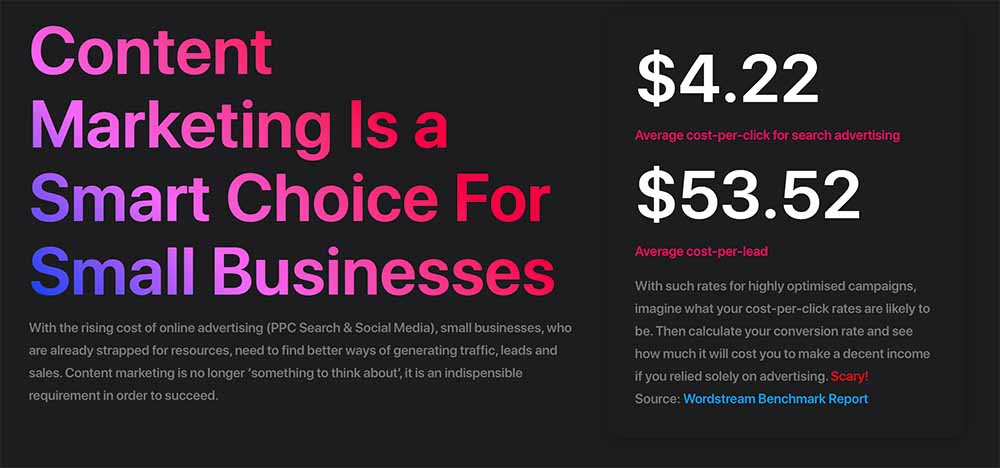
Table of Contents
With the rapidly evolving online landscape, especially with the advent of generative AI tools such as chatGPT, the importance of content marketing cannot be overstated. Content marketing has become a cornerstone of modern business strategies, playing a crucial role in enhancing online presence and driving revenue growth. In this article, we delve into the key aspects of content marketing and its significance for businesses.
The Real Importance of Content Marketing
One of the key benefits of content marketing is that it increases brand visibility. By consistently creating and sharing valuable content, businesses can reach a wider audience and make their brand more recognizable. This visibility can lead to increased website traffic, social media engagement, and overall brand awareness, ultimately contributing to the growth and success of the business.
Another important benefit of content marketing is improved customer engagement. When businesses provide relevant and useful content to their target audience, they can effectively engage with them and build a loyal customer base. This engagement can lead to increased customer satisfaction, repeat business, and positive word-of-mouth referrals, all of which are essential for long-term success in today’s competitive market.
Content marketing also contributes to higher conversion rates. By delivering valuable content that addresses the needs and pain points of their audience, businesses can attract and retain potential customers, ultimately leading to more conversions. Whether it’s through informative blog posts, compelling videos, or engaging social media content, content marketing can significantly impact the decision-making process of potential customers and drive them towards making a purchase or taking a desired action.
Content Marketing Strategy
Developing a well-planned content marketing strategy is crucial for businesses to effectively reach and engage their target audience. This involves conducting thorough research to identify the demographics, interests, and behaviors of the audience, which then informs the creation of valuable and relevant content that resonates with them. By understanding the needs and preferences of the target audience, businesses can tailor their content to address specific pain points and provide solutions, ultimately establishing trust and credibility with their audience.
Furthermore, a strategic approach to content marketing also involves carefully selecting the appropriate channels for distributing the content. Whether it’s through social media, email marketing, blogs, or other platforms, businesses need to ensure that their content reaches their audience where they are most active. This strategic distribution not only increases the visibility of the content but also maximizes its impact, leading to increased brand awareness, website traffic, and ultimately, conversions.
Ultimately, a well-executed content marketing strategy can have a significant impact on a company’s return on investment (ROI) and overall business growth. By consistently delivering valuable and relevant content to the target audience, businesses can build a loyal customer base, drive customer engagement, and ultimately increase revenue. This strategic approach to content marketing not only enhances a company’s online presence but also establishes it as a thought leader in its industry, setting the stage for long-term success and sustainability.
Content Marketing Statistics
Content marketing statistics are essential for businesses to understand the impact of their content marketing efforts. By tracking metrics such as website traffic, engagement rates, and lead generation, businesses can gain valuable insights into the effectiveness of their content marketing strategies. For example, if a business sees a significant increase in website traffic after implementing a new content marketing campaign, it indicates that the content is resonating with the target audience and driving more visitors to the website.
Furthermore, analyzing content marketing statistics can help businesses identify areas for improvement and optimization. For instance, if the engagement rates for a particular type of content are lower than expected, businesses can use this information to adjust their content strategy and create more engaging and relevant content for their audience. This proactive approach to analyzing statistics can lead to better results and a more impactful content marketing strategy.
Overall, content marketing statistics provide businesses with the data-driven insights they need to make informed decisions and continually improve their content marketing efforts. By regularly monitoring and analyzing these statistics, businesses can adapt their strategies to better meet the needs and preferences of their target audience, ultimately leading to enhanced online presence and revenue growth.
Content Marketing ROI
Measuring the return on investment (ROI) of content marketing is crucial for businesses to understand the impact of their efforts. By tracking the performance of content marketing initiatives, companies can make informed decisions about where to allocate resources and how to optimize their strategies. This data-driven approach allows businesses to identify which types of content resonate most with their target audience and which channels are most effective for distribution, ultimately leading to a more efficient and effective content marketing strategy.

A well-executed content marketing campaign has the potential to deliver a high ROI by attracting and retaining customers, driving sales, and enhancing brand loyalty. When businesses create valuable and relevant content that addresses the needs and interests of their audience, they can establish themselves as industry leaders and build trust with their customers. This, in turn, can lead to increased customer retention and loyalty, as well as a higher likelihood of referrals and recommendations, all of which contribute to a positive ROI for the business.
According to the Content Marketing Institute, 73% of B2B marketers and 70% of B2C marketers use content marketing as part of their overall marketing strategy.
Search engine journal
Businesses that prioritize content marketing are likely to experience significant returns on their investment. By consistently producing high-quality content that engages and educates their audience, companies can position themselves for long-term success. Content marketing not only helps to enhance online presence and visibility but also contributes to driving revenue growth and establishing a strong brand reputation. As such, the ROI of content marketing goes beyond just financial metrics, encompassing the overall impact on the business’s growth and success.
Content Marketing Impact
Content marketing has a significant impact on businesses’ online presence and revenue growth. By creating and sharing valuable content, businesses can attract and engage their target audience, ultimately leading to increased brand awareness and visibility. This, in turn, can drive more traffic to their website and social media platforms, resulting in potential leads and sales opportunities.
Furthermore, content marketing can also influence purchasing decisions and nurture customer relationships. When businesses consistently provide relevant and valuable content to their audience, they can build trust and credibility, making it more likely for customers to choose their products or services. Additionally, by maintaining a strong online presence through content marketing, businesses can stay top-of-mind with their customers, leading to increased customer loyalty and repeat business.
Overall, the impact of content marketing goes beyond just creating brand awareness. It allows businesses to establish themselves as industry leaders by consistently delivering valuable content that educates, inspires, and engages their audience. This positions them as go-to resources within their industry, giving them a competitive edge and ultimately contributing to their long-term success.
The Role of AI in Content Creation
Artificial intelligence (AI) has become an integral part of content marketing, offering businesses a powerful tool to analyze data and gain valuable insights into consumer behavior. By leveraging AI-powered tools, businesses can better understand their target audience, their preferences, and their online behavior. This allows for the creation of highly personalized content that resonates with the audience, ultimately leading to increased engagement and conversions.
Furthermore, AI enables businesses to automate various marketing processes, such as content distribution and customer segmentation. This automation not only saves time and resources but also ensures that the right content is delivered to the right audience at the right time. As a result, businesses can achieve greater efficiency and effectiveness in their content marketing efforts, driving better results and revenue growth.
The use of AI in content creation is not just a trend; it is a fundamental shift in the way businesses approach marketing. By harnessing the power of AI, businesses can stay ahead of the competition, adapt to changing consumer preferences, and deliver content that is not only relevant but also timely and impactful. As AI continues to evolve, its role in content marketing will only become more significant, making it essential for businesses to embrace this innovative approach to stay competitive in the digital landscape.


